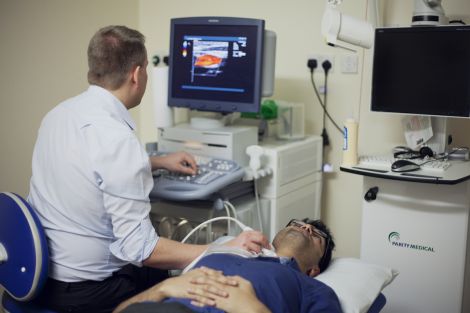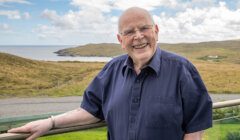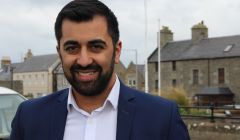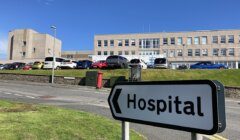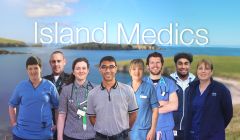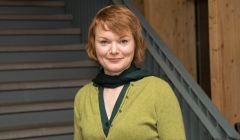Health / Stroke survivors give powerful accounts to health board members
TWO local people have given powerful accounts of their experience of having a stroke.
They presented their stories to members of the NHS Shetland board during the board’s latest meeting earlier this week to give a first-hand insight into their experiences of accessing healthcare.
A stroke is a serious life-threatening medical condition that happens when the blood supply to part of the brain is cut off.
Eileen Macleod, who is a practice nurse, said she suffered a stroke in 2014.
It came as a total surprise, with Eileen having no idea “I had anything wrong at all”. She said it happened due to spike in high blood pressure.
She was taken to Aberdeen for treatment, where she spent five weeks, although she has “no recollection” of her stay south.
Eileen was then transferred back to the Gilbert Bain Hospital in Lerwick.
“I made what I think is a remarkable recovery,” she said, adding that while she has some effect on her left side there has been no impact mentally from her stroke.
“For my family it was a huge, huge shock.
“We have had a few difficult moments but we have worked through it.”
She said part of her recovery has been “constantly challenging yourself to do things”, while she has often used a wheelchair.
Eileen said she wanted to return to work, and she is currently back as a practice nurse two days a week.
She said the increased reliance on technology during the Covid-19 pandemic, such as video appointments, has made it easier for her to work from home.
“Not that I’m saying Covid has been a good thing (…) but it’s certainly expanded my ability to work,” Eileen said.
She also thanked health staff for helping her during her recovery.
Laurence Hunter, meanwhile, said his journey started in the summer of 2017.
Become a member of Shetland News
Things started off with a burning sensation in his back which passed, but three days later his stomach was affected. He ended up being unable to move his leg from his knee down.
Laurence said he went to A&E in Lerwick before he was flown to Aberdeen.
Tests were inconclusive and he returned home. At the end of February 2019, however, he felt the sensation and nausea again while in the office.
His condition deteriorated to the point where his leg gave way. “I had to crawl to bed that night,” he said.
He was flown to Aberdeen where he had scans and tests, with Laurence saying he was paralysed from the rib cage down.
After some time in hospital he was transferred to a rehab unit, where he was fitted with plastic splints and was given a wheelchair.
He said he spent around seven and a half weeks there getting physio.
Laurence said he then spent a further six weeks in the Gilbert Bain before he managed to get home.
He has had to adapt his home, such as the access to the shower, and is still receiving physio treatment, but Laurence said he there was no impact mentally from his stroke.
Specialist stroke nurse Dorothy Storey said the number of strokes in Shetland has reduced over the last 15 years, from about 50 to 55 a year to around 30 or 40.
She said cutting back on smoking and drinking are some of the lifestyle improvements that can help to reduce the risk.
“These things are having an effect, but there’s a lot of work to do,” Storey said.
She said time is of the essence during treatment as 1.9 million neurons are lost each minute in which a stroke is untreated.
Some of the treatment available includes thrombolysis, which can break down and disperse a clot that is preventing blood from reaching the brain, although this is generally used within four hours of symptoms.
Storey added that a host of healthcare services can get involved during the treatment of a stroke.
This ranges from doctors, physios and occupational therapists to dieticians, continence nurses and speech and language therapists.
When asked if there was any feedback about the healthcare they received, Eileen said the main thing was having to travel from her home in Sandness in the outer reaches of the westside to Lerwick for physio.
She said it is now “all centralised in Lerwick”.
“The drive is tiring enough,” Eileen said.
“It was against what we were trying to do, because I was so tired after it.”
She said other than that, the help she received was “exceptional”.
Laurence said his main piece of feedback was the amount of time he had to spend in a hospital and medical environment.
The NHS says the main symptoms of a stroke can be remembered with the word ‘FAST’:
- Face – the face may have dropped on one side, the person may not be able to smile, or their mouth or eye may have dropped.
- Arms – the person with suspected stroke may not be able to lift both arms and keep them there because of weakness or numbness in one arm.
- Speech – their speech may be slurred or garbled, or the person may not be able to talk at all despite appearing to be awake; they may also have problems understanding what you’re saying to them.
- Time – it’s time to dial 999 immediately if you see any of these signs or symptoms.
The Stroke Association said on average a stroke happens around every five minutes in the UK.
It added that there are over 1.2 million stroke survivors in the country.
Become a member of Shetland News
Shetland News is asking its readers to consider paying for membership to get additional perks:
- Removal of third-party ads;
- Bookmark posts to read later;
- Exclusive curated weekly newsletter;
- Hide membership messages;
- Comments open for discussion.
If you appreciate what we do and feel strongly about impartial local journalism, then please become a member of Shetland News by either making a single payment, or setting up a monthly, quarterly or yearly subscription.






